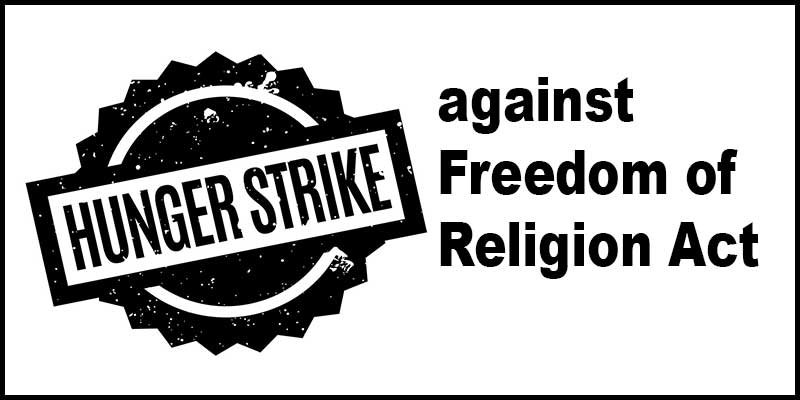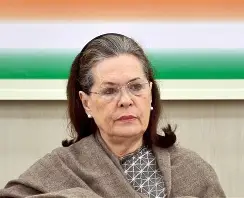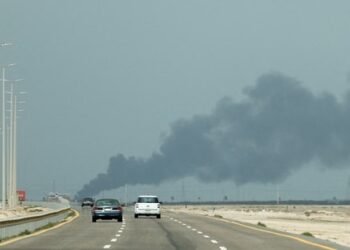Protest for Rights: As the Arunachal government moves to enforce a decades-old anti-conversion law, members of the Christian community rally against what they see as a violation of their fundamental rights.
BY PC Bureau
The Arunachal Christian Forum (ACF) is holding an eight-hour hunger strike on Monday to protest against the implementation of the Arunachal Pradesh Freedom of Religion Act (APFRA), 1978.
ACF President Tarh Miri stated that the hunger strike would continue until 5 p.m. at the Nyishi Indigenous Identity Society Nyokum ground in Borum village. This demonstration is part of their democratic movement opposing the state BJP government’s decision to enforce a 46-year-old anti-conversion law.
Several Christian legislators are expected to join the hunger strike organized by the ACF.
ALSO READ: Japanese Teen Rescued from Myanmar Scam Center as Thousands Remain Trapped
Earlier this month, the ACF announced a series of agitations after Chief Minister Pema Khandu declared that the Arunachal Pradesh Freedom of Religion Act, 1978—dormant until now—would soon have its rules framed and implemented in the state.
The Chief Minister’s
Arunachal Christian Forum (ACF) PRESIDENT TARH MIRI. pic.twitter.com/h4YP8MYUvw
— Arunachal Digital News (@ArunachalDNews) February 16, 2025
announcement follows a directive from the Itanagar bench of the Gauhati High Court instructing the state government to finalize the draft rules of the Act within six months from September 2024.
Despite the ACF’s opposition to the law’s implementation, the Chief Minister has assured that the government is open to discussions and reiterated that the proposed rules under the Act do not target any religious community.
ACF President Miri revealed plans to gherao the state Assembly on March 6, when the Act is expected to be debated before its implementation. He argued that, despite its name, the Act is designed to restrict religious freedom.
“We have organized this protest to express our opposition to a law that has remained dormant for four decades,” Miri said, criticizing the government’s perceived indifference to the ACF’s concerns regarding the decades-old legislation.
Miri noted that in November last year, they had discussed the matter with the Chief Secretary and submitted a letter to Chief Minister Pema Khandu. The Chief Minister had then advised them to meet with his advisor, Alo Libang.
According to Miri, the move to implement the Act contradicts the spirit of secularism.
In December last year, the Chief Minister stated that the Freedom of Religion Act would be implemented once its rules were finalized.
The Arunachal Pradesh Freedom of Religion Act was originally passed by the state Assembly under the Janata Party-led government of then Chief Minister P.K. Thungon. The Act, which received presidential assent on October 25, 1978, prohibits religious conversions through force, inducement, or fraudulent means.
The law was reportedly enacted to address concerns over a perceived threat to indigenous religions in the state. However, successive governments chose to sideline its enforcement.
ALSO READ: Kuki-Zo Diaspora Seeks U.S. Prez Intervention in Manipur Crisis
What is the Arunachal Pradesh Freedom of Religion Act (APFRA), 1978?
The Arunachal Pradesh Freedom of Religion Act (APFRA), 1978, is a law passed by the state Assembly during the Janata Party-led government under Chief Minister P.K. Thungon. The Act, which received presidential assent on October 25, 1978, seeks to prohibit religious conversions carried out through force, inducement, or fraudulent means. It was reportedly enacted in response to concerns about the potential threat to indigenous religious practices in the state. However, successive governments chose not to implement it, leaving it dormant for over four decades.
In September 2024, the Itanagar bench of the Gauhati High Court directed the Arunachal Pradesh government to finalize the draft rules for the Act within six months. Following this directive, Chief Minister Pema Khandu announced plans to frame and implement the Act’s rules, leading to protests from the Christian community and religious organizations.
What is the fear of the Christian community?
Members of the Arunachal Christian Forum (ACF) are strongly opposing the implementation of the APFRA, 1978, fearing that it will be used to curtail their religious freedom.
ACF President Tarh Miri emphasized that while the Act claims to uphold religious freedom, it is perceived as a tool to restrict the practice of Christianity in the state. Miri stated that despite previous discussions with the Chief Secretary and a formal letter submitted to Chief Minister Pema Khandu, the government has remained indifferent to their concerns.
The Chief Minister has assured that the proposed rules under the Act are not intended to target any religious group and has expressed willingness to hold discussions on the issue. However, the ACF remains unconvinced and has planned further agitation, including a protest at the state Assembly on March 6, when the Act is expected to be discussed before implementation.
The ACF sees the move as a violation of secularism and has vowed to continue its opposition until the government reconsiders its decision.













